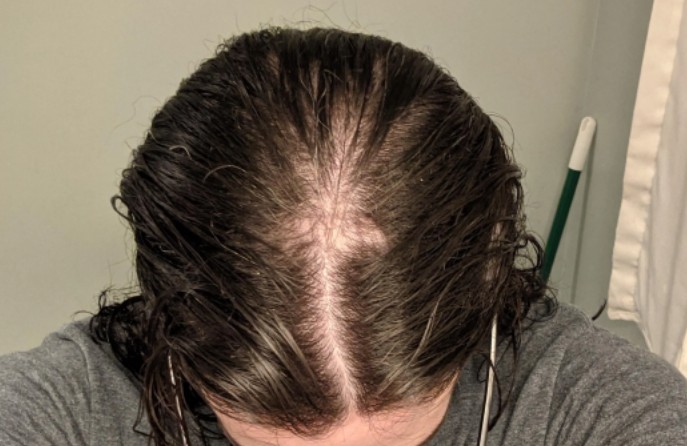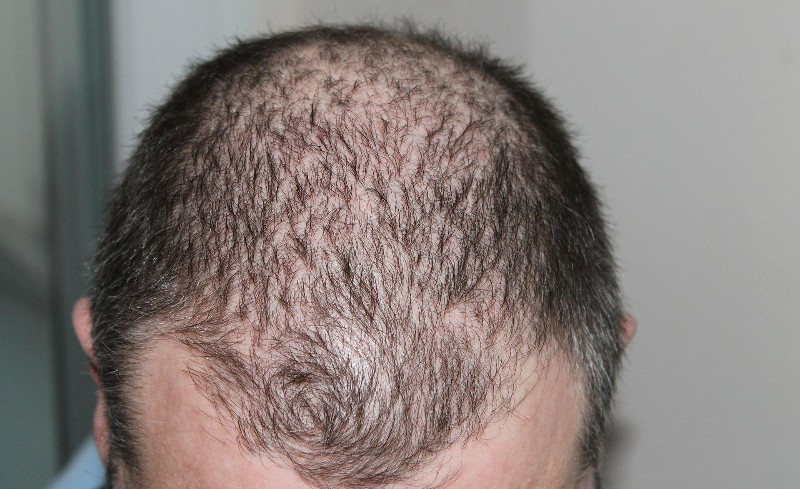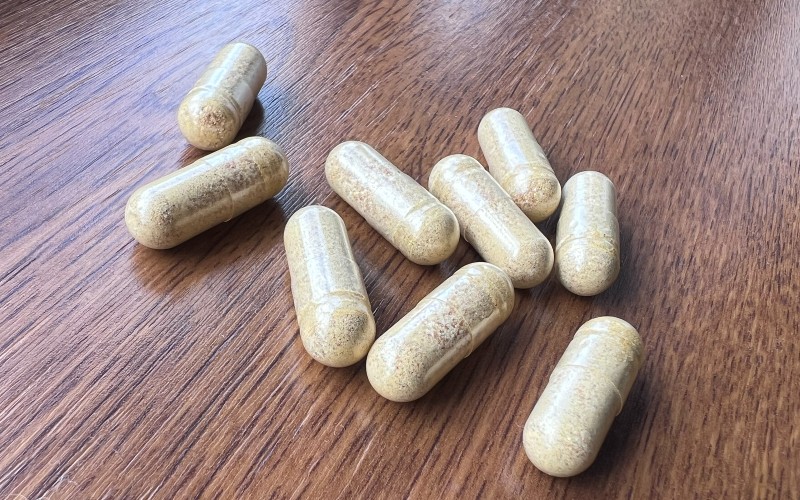When combating the primary causes of hair loss in men (and in some women), one of the most effective treatment options is DHT blockers.

But you might be wondering if there are any side effects of blocking DHT – is this a medication you can take freely, or are there risks associated?
Does blocking DHT have side effects?
DHT blockers do have side effects. With medication, the risks include erectile dysfunction, breast growth, and lowered libido. Topical treatments (shampoo) have a low risk of dermatitis, while vitamins and natural DHT blockers have very low chances of side effects but are also much less potent.
The key points that you need to know are:
- Around 1.5% of people taking Finasteride suffer side effects
- A very small percentage of people can be affected even if they stop taking the medication
- Topical DHT blocker shampoo can cause skin irritation
- Vitamins and natural DHT blockers are very low risk but often aren’t effective at preventing hair loss
What are the side effects of blocking DHT?
Normally when talking about blocking DHT, we’re referring to approved medication that blocks the conversion of testosterone into DHT. There are other options with fewer side effects, including topical medication and natural options, which I’ll cover later.
Some of the potential side effects of using DHT blockers include:
- Erectile dysfunction
- Decreased libido
- Ejaculatory dysfunction – either reduced amounts of ejaculate or less concentrated/more ‘watery’. This can also lead to infertility.
There are other side effects that are less common too, which include:
- Testicular pain
- Gynecomastia – growth and sensitivity in the breasts
- Depression
- Serious allergic reaction
- Male breast cancer
It’s worth reiterating that these are all potential side effects only and that most people who take DHT blockers won’t be affected.

Of course, the risk of these may be enough to deter you from taking the medication. It’s subjective – while I would always advocate more natural options such as shaving your head, some people may not be open to that and would prefer to try the medication route in order to keep their hair.
Can DHT blockers be harmful?
DHT blockers can be harmful in that some of the potential side effects have, in limited cases, been shown to be irreversible. A small percentage of people who take Finasteride have suffered long-term sexual side effects including permanent erectile dysfunction, lack of libido and more, even after ending treatment for a number of years.
This can of course lead to other persistent conditions, particularly neurological and psychological side effects such as long-term depression that may trigger significantly related trauma. I have seen one Reddit thread from someone who claims they took Finasteride and have since suffered suicidal thoughts due to the damage it has done to their endocrine system.
The term that has been coined by sufferers is “Post-Finasteride Syndrome” or PFS. However, it is only a phrase created by sufferers and it is not an official term. Indeed PFS has been labeled “ill-defined and controversial” by one of the biggest medical journals in the world, the BMJ.
It’s clear that DHT blockers do have the potential to be harmful but in rare cases.
However, this is only referring to lasting damage caused by those who stop taking the medication, which is defining harm by irreversible change to the body.
This doesn’t paint a full picture, because it doesn’t account for the fact that the medication is not a temporary solution to hair loss. If you are taking Finasteride, you are doing so with the intention of taking it for the rest of your life.
And so if you do suffer from the side effects caused by the medication, they are in essence permanent too, unless you decide to stop taking the medication. For most people that will stop the side effects, so technically the medication hasn’t been harmful, but do you want to live with those sexual side effects permanently while taking the medication if you are one of those affected?
How common are the side effects of DHT blockers?
The ‘common’ side effects of DHT blockers – problems getting an erection, a lack of libido, or a change in ejaculate consistency – occur in about 1% of cases although statistics vary. The FDA’s label claims that side effects occur in “≥ 1%” so greater than or equal to 1%.
The label has more detail and breaks down the percentage of men reported to suffer from the various symptoms within the first year of taking the medication, based on clinical trials.
- Decreased libido – 1.8%
- Erectile dysfunction – 1.3%
- Ejaculation disorder – 1.2%
- Decreased volume of ejaculate – 0.8%
It’s also worth noting that 1.2% of those taking the drug chose to stop taking it within their first year due to sexual side effects.
The FDA’s label does note the potential for long-term or more serious side effects, but claims that the reporting is voluntary and therefore can’t be used as a reliable estimate. Across the pond, the NHS in the UK claims that more serious side effects affect 1 in every 1000 people who take the medication.
As a guide, there are an estimated 2.2 million people taking Finasteride in the US every year. If the NHS’s estimate is accurate, that means around 2,200 people in the US are suffering from more serious side effects of the medication.
Do DHT-blocking shampoos have side effects?
The side effects of DHT-blocking shampoo are significantly lesser than the medication options, and primarily include the potential for irritated skin, although this is rare. Minoxidil, the key DHT-blocking ingredient, can lower blood pressure but only in very rare cases and where the skin is broken.
The key risks of using DHT-blocking shampoos are the potential for your scalp to be dried out, or for the hair to be stripped of oils, but this doesn’t generally happen with most users. You should still condition your hair once you’ve washed it with Minoxidil shampoo, just to make sure it is protected. Otherwise, the shampoo you’re using to protect your hair could in fact damage it.
The potential for these shampoos to cause problems with blood pressure is very rare. When applied topically (any topical DHT blocker is a substance applied to the skin or hair, so shampoos are called topical treatments) the Minoxidil won’t be absorbed into the bloodstream so won’t be an issue.
The only consideration is any cuts on your scalp that allow it to penetrate. Even then, it’s only an issue for anyone suffering from cardiovascular disease, but if that’s you, it’s best to consult your doctor before using DHT-blocking shampoo.
DHT-blocking vitamins side effects
There are no major DHT-blocking vitamin side effects that you need to be concerned with, provided you follow the correct dosage.
Vitamins that claim to help block DHT work differently from Finasteride and so don’t have the same negative side effects, but they are also much less effective at preventing hair loss.

To explain this, I need to briefly explain the problems around DHT. DHT is a hormone that is an offshoot of testosterone – it’s created through the conversion of testosterone, and it impacts many of the same sexual functions as testosterone but at a more potent level.
The problem with DHT is that, when elevated, it can cling to hair follicles and cause them to weaken and eventually die.
Finasteride reduces the conversion of testosterone into DHT, so it has a direct and measurable impact.
DHT-blocking vitamins don’t block that conversion, but instead claim to ‘block’ DHT from clinging to your hair follicles, usually by promoting healthy blood flow and improving other related health measurements.
The good news about this is that there are very few negative side effects. Vitamins can vary, so there’s no single summary of what those side effects are, but vitamins typically only improve your health.
However, they’re not going to be as effective at reducing hair loss as Finasteride, just because of the way they work.
Side-effects of naturally blocking DHT
Naturally blocking DHT using certain food products won’t cause negative side effects but it will also have a very limited effect on hair loss. Most people who claim to have success with using natural DHT blockers are doing so in conjunction with medication, which will be the primary cause of hairline improvement.
Some of the foods that people recommend trying to help block DHT and fight hair loss include:
- Green tea
- Onions
- Pumpkin seeds
- Turmeric
- Berries
- Avocado
- Edamame beans
- Coconut oil
- Almonds
- Eggs
- Walnuts
- White mushrooms

None of these foods have been medically proven to prevent hair loss and success stories are purely anecdotal. They essentially are providing vitamins that can help to improve blood flow, strengthen the hair follicles or otherwise improve your body’s functions, but they don’t block DHT.
If you’re worried about the side effects of DHT blockers, but don’t want to try surgical treatments or just shave your head, then feel free to try incorporating these foods into your diet. But I wouldn’t suggest you should expect guaranteed results.
Summary – Is blocking DHT a good idea?
Whether blocking DHT is a good idea or not is completely subjective, and I understand why some people turn to medication to try to prevent hair loss. The idea of surgery, or embracing baldness and shaving your head, might be a serious cause of anxiety for you, and you may want to exhaust your options.
However, my advice would be to consider the potential side effects carefully if you intend to use DHT-blocking medication, particularly as there could be permanent damage if you’re one of the rare cases.
Everyone is entitled to make their own decisions regarding how they handle their hair loss, so I won’t say you should definitely avoid medication.
I would just say that you absolutely have to make sure you are aware of the potential repercussions and that you consider every option before you commit to it. Particularly as the medication is intended to be a lifelong treatment.
Just don’t leave yourself in a balding state, constantly worrying if your hair loss is getting worse and becoming more noticeable. If you’re not sure of the best way forward, grab my guide below which will help you decide the best course of action:
Have you tried DHT blockers? Let me know what your experience was in the comments below.

